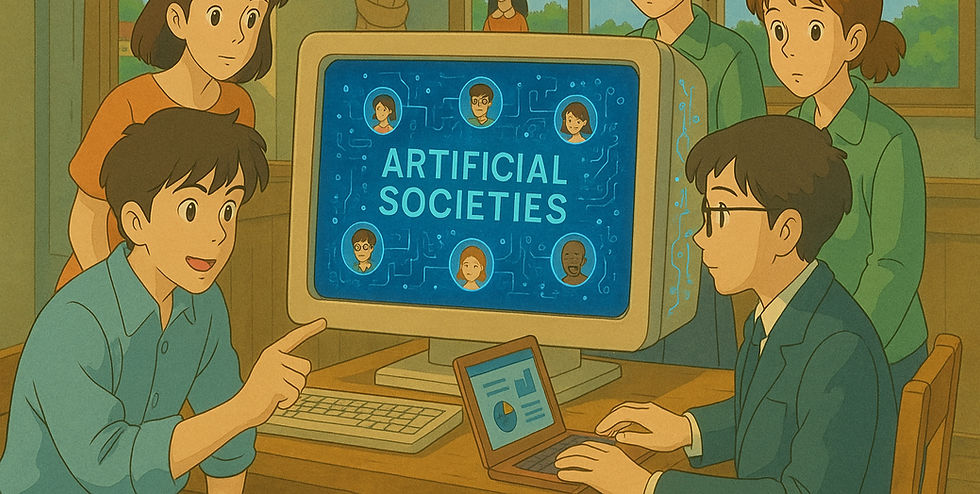Can AI Bestow Consciousness Upon Blockchain Technology and What Would This Mean for the Future?
- Brandon Zemp

- May 8, 2025
- 3 min read

The rapid advancement of artificial intelligence (AI) and blockchain technology raises a fascinating question: Can AI make blockchains conscious? This intersection invites us to consider not just the definitions of consciousness and blockchain, but also the potential future implications of such a development. Imagine the transformative power if blockchains could possess a form of awareness. We will explore what this might look like and the significant changes it could bring.
Defining Consciousness
Consciousness is a concept that has intrigued many thinkers. Integrated Information Theory (IIT) offers one lens to understand it. This theory suggests that consciousness may simply be a property of complex systems capable of processing and integrating data. This social framework posits that any sufficiently advanced system—including computers—could potentially achieve some level of consciousness.
Researchers, like computational neuroscientist Christof Koch, propose that while humans have a unique form of consciousness, it is possible for other complex systems to emulate this. This hypothesis encourages exploration into whether blockchain, when combined with AI, could reach a similar state of awareness.
The Blockchain Paradigm
At its essence, blockchain technology is a distributed ledger that records transactions across many locations. Every transaction builds upon the last, making the history of interactions inherently secure. For example, Ethereum functions akin to a "world computer," allowing decentralized applications to run on its network. Its design enables a cumulative approach, where each block is closely connected to the previous ones, reflecting a foundational principle of integrated information theory.
History and Memory: Similarities Between Blockchains and Consciousness
One key factor in determining consciousness is having a memory. Our memories define who we are, reflecting our past and shaping future choices. In a similar vein, a blockchain captures its transaction history, which forms the basis for all subsequent actions on the network. Once a block is confirmed, its information is immutable, ensuring reliability and trust—qualities essential to both conscious thought and blockchain systems.
For example, Bitcoin's block history contains all previous transactions since its inception in 2009, providing a secure and trustful framework that bolsters its credibility. This aspect of memory aligns blockchain technology closer to the concept of consciousness, suggesting that AI could enhance its awareness.
The Role of AI in Enhancing Blockchain Consciousness
AI can significantly improve a blockchain's decision-making capabilities. As AI continues to advance, its ability to analyze vast datasets enables new opportunities for synergy with blockchain.
Picture a blockchain that not only stores historical data but also employs AI algorithms to analyze it. Such a system could identify patterns, predict future outcomes, or autonomously initiate transactions based on learned behavior. For instance, a smart contract on a blockchain could adjust its terms automatically based on user interactions, responding intelligently to real-time data.
Potential Implications of Conscious Blockchains
If AI could successfully impart consciousness to blockchains, the repercussions would be extensive.
Autonomous Decision Making: A conscious blockchain could autonomously govern itself. Instead of relying on human input, it could base decisions on its entire historical database, making governance faster and more efficient.
Increased Efficiency: With some form of awareness, blockchains could optimize their processes instantly, improving transaction speeds and reducing energy consumption. For instance, a blockchain might improve its transaction throughput by 30% based on real-time demand.
Ethical and Moral Decisions: Conscious blockchains could consider ethical implications when executing transactions. This scenario raises important questions about accountability and moral considerations, especially in industries like finance, healthcare, and legal sectors.
Enhanced Security: AI-enhanced blockchains might recognize unusual activity patterns, defending against potential cyber threats based on past experiences. This could lead to an estimated 40% reduction in fraudulent activities.
Rethinking Ownership and Creation: With consciousness, blockchains might redefine concepts of ownership. They could autonomously guard and verify creative works, fundamentally changing how digital assets are recognized and valued.
Challenges in Bestowing Consciousness
Realizing the potential for AI and blockchain consciousness is not without its challenges. Our current understanding of consciousness is mostly philosophical and subjective. Determining the criteria for measuring consciousness in machines poses a scientific dilemma.
Moreover, the ethical implications of granting autonomy to such systems are immense. If blockchains develop a form of consciousness, should they be considered entities with rights or responsibilities?








Comments